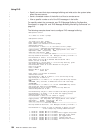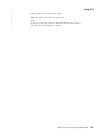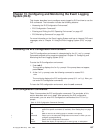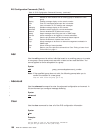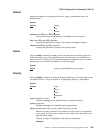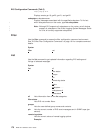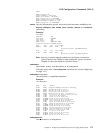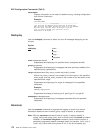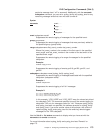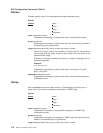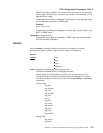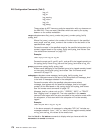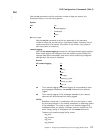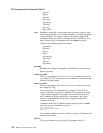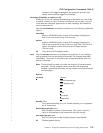
trace-status
Displays information on the status of packet tracing, including configuration
and run-time information.
Example:
list trace-status
------------------------- Configuration -----------------------------
Trace Status:ON Wrap Mode:ON Decode Packets:ON HD Shadowing:ON
RAM Trace Buffer Size:100000 Maximum Trace Buffer File Size:10000000
Max Packet Bytes Trace:256 Default Packet Bytes Traced:100
Trace File Record Size:2048 Stop Trace Event: TCP.013
Maximum Hours to HD Shadow: 1
Nodisplay
Use the nodisplay command to select and turn off messages displaying on the
console.
Syntax:
nodisplay
event. . .
group...
range...
subsystem...
event
subsystem.event#
Suppresses the displaying of a specified event (
subsystem.event#
).
group
groupname
Suppresses the displaying of messages that were previously added to the
specified group (
groupname
).
range
subsystemname first_event_number last_event_number
Where
first_event_number
is the number of the first event in the specified
event range, and
last_event_number
is the number of the last event of the
specified event range.
Suppresses the displaying of a range of messages for the specified
subsystem.
Example:
nodisplay range gw 19 22
Suppresses the display of events gw.19, gw.20, gw.21, and gw.22.
subsystem
subsystemname
Suppresses the displaying of messages associated with the specified
subsystem.
Noremote
Use the noremote command to suppress the logging of events to a remote
workstation based on event number, group, range of events, or subsystem.
Note: With the noremote command, there is usually no need to specify a
syslog_facility
and
syslog_level
, such as there is with the remote command.
However, for noremote subsystem command, there exists the option of
selectively suppressing specific message levels (for example, “error” only or
“trace” only) rather than turning them all off. (If you do not specify any
ELS Configuration Commands (Talk 6)
172
MRS V3.2 Software User’s Guide



